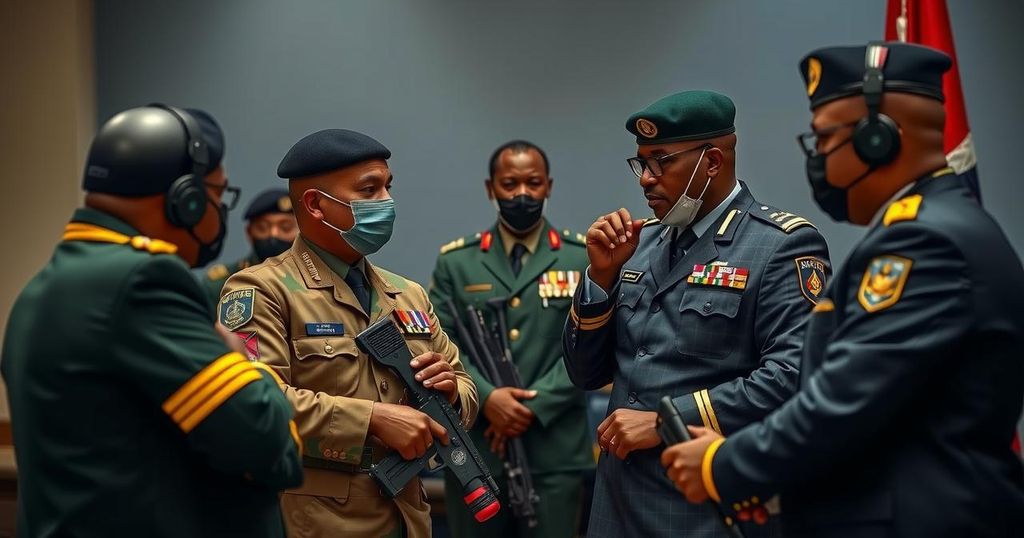Russia and China opposed the U.S. initiative to convert the Kenya-led force in Haiti into a U.N. peacekeeping mission amidst rising gang violence. The U.S. argued this change would secure necessary funding, but concerns were raised regarding the suitability of peacekeeping forces in Haiti’s current violent environment. Despite the pushback, leaders in Haiti have called for such an intervention to address urgent security needs.
On Wednesday, Russia and China expressed their opposition to the United States’ initiative to convert the Kenya-led multinational force in Haiti into a U.N. peacekeeping mission. These two nations convened a U.N. Security Council meeting in light of escalating gang violence in Haiti, where gangs now control approximately 85% of the capital, Port-au-Prince. The U.S. had proposed this shift in early September in an attempt to secure regular financing for the financially challenged multinational force.
Despite attempts to garner support for the resolution, Russia and China refused to engage, articulating their position during the recent council meeting. China’s Deputy U.N. Ambassador, Geng Shuang, stated that revisiting the mandate so soon after its recent extension would hinder efforts to resolve ongoing funding issues and procure necessary police support. He emphasized that peacekeeping forces should only be deployed in areas where peace prevails, indicating that Haiti’s current climate is unsuitable for such operations.
The multinational force, which is meant to include 2,500 international police, currently has only about 430 personnel deployed. This shortfall further exacerbates the situation as the force grapples with funding, having received a mere $85.3 million of the $96.8 million pledged by various nations. Russia’s Deputy U.N. Ambassador, Dmitry Polyansky, echoed these concerns, asserting that the resources and conditions in Haiti are incompatible with the establishment of a peacekeeping mission.
Despite the discontent with the U.N. peacekeeping proposal, Haiti’s leaders continue to advocate for U.N. assistance, and a resolution backing this request was adopted by the Organization of American States. The Kenyan National Security Adviser, Monica Juma, observed that the multinational force had secured essential infrastructure, yet emphasized a pressing need for additional resources. U.S. Deputy Ambassador Dorothy Shea also underscored the importance of transitioning to a peacekeeping mission to leverage U.N. support systems.
Further accentuating the urgency of the situation, Haitian physician Dr. Bill Pape urged the Security Council for intervention, acknowledging the historical challenges associated with foreign troops but asserting that the current crisis demands immediate action. He stated, “I trust that seeking your support to restore security in my country is not asking too much.”
The dialogue among U.N. members thus reflects a complex interplay of geopolitical interests and the fundamental need for effective relief strategies in Haiti, underscoring how immediate intervention remains crucial if stability is to be restored.
The situation in Haiti has deteriorated significantly as gang violence escalates, leading to rampant insecurity in Port-au-Prince. In September, the United States proposed transforming the Kenya-led multinational force into a U.N. peacekeeping mission to secure more reliable funding for the operation, which faces a serious financial crisis. Despite this proposal, Russia and China have expressed their dissent, citing concerns over the appropriateness of deploying peacekeeping troops in a volatile environment lacking peace.
In summary, the reluctance of Russia and China to support the transformation of the Kenya-led force into a U.N. peacekeeping mission highlights the complexities involved in addressing Haiti’s ongoing challenges. While the need for urgent international assistance is clear, the appropriateness and timing of deploying peacekeeping troops remains contentious. As stakeholders continue to navigate these issues, the priority remains to provide effective support to restore stability and security in Haiti.
Original Source: www.durangoherald.com






